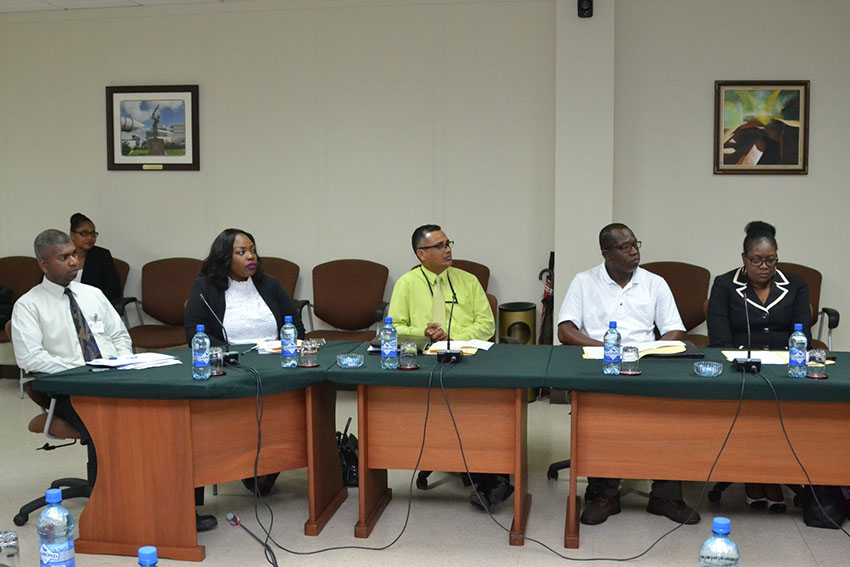Attorney General Basil Williams SC on Friday sounded a warning to both the Special Organised Crime Unit (SOCU) and the Financial Intelligence Unit (FIU), saying that they need to secure convictions as they are critical to showing the effectiveness of measures Guyana has taken to combat money laundering.

Williams was at the time addressing two dozen participants at a half-day seminar that was hosted by the Ministry of Legal Affairs and the Anti-Money Laundering/Countering the Financing of Terrorism (AML/CFT) National Coordinating Committee on preparation for the Fourth Round of Mutual Evaluations by the Caribbean Financial Action Task Force (CFATF).
SOCU and the FIU were among the supervisory authorities represented at the seminar, which was held at the Bank of Guyana (BoG). Also represented were the BoG, the Gaming Authority, the Guyana Geology and Mines Commission and the Guyana Revenue Authority.
Williams said that after a “painful” journey, Guyana is presently in the fourth round of mutual evaluations, which is scheduled for the fourth quarter of 2021 although a pre-onsite visit may start a year prior to that date.
He warned that if “we don’t prepare ourselves and execute, you will be back in the hole, as Trinidad is right now. In fact the Attorney General has just written… me as the Chair of CFATF [Caribbean Financial Action Task Force] complaining that their situation has been misdescribed and misrepresented.” Williams pointed out that Guyana has to get it right. “It looks as though we have a lot of time. We don’t have a lot of time. There is a lot of things to do and therefore we have to know from the outset in your particular niche what you are required to do,” he said.
He also noted that government is looking to reshape and transform Guyana’s image. “The region must know that there is a shift right now and so when they use to dog us out it was for simple matters. They must see us as a country with standards and a country that has due regularity,” he said.
It was explained that the fourth round deals with the 40 FATF recommendations and immediate outcomes. Williams stressed that the most important aspects of this round are technical compliance and effectiveness. He said it is still being said, and rightfully so, that Guyana still has serious money laundering deficiencies, which include laying charges and securing convictions. “Therefore the FIU and SOCU are both put on notice because they both know how they measure effectiveness and that has to do with convictions. So, there is no way we could graduate out of the fourth round without showing convictions,” he said, while citing the case of The Bahamas, where suspicious transaction reports were recorded but no convictions. He noted that both Guyana and Bahamas are in a “pool” which allows for a year grace period to get things in order, failing which it is the “hole.” He said once a country finds themselves in this position, FATF issues a public statement, which puts the world on notice to adopt countermeasures against that particular country. These countermeasures include “not dealing with you, not dealing with your institutions unless… there is enhanced due diligence,” he added.
Director of SOCU Sydney James also spoke at the seminar and he said that the main challenge for the agency is the adequacy of staff, given that most are “regular” police officers who are not familiar with financial crimes. As a result, those ranks are currently undergoing training. The unit’s budget, he added, is another area of concern and he voiced his hope that these and the other challenges can soon be addressed.
James said initially there were challenges with the legislation but that has since been sorted out and the unit is in a “better place now.” He anticipated that the number of prosecutions and possible convictions will “rise and would assist us as we attempt to provide favourable statistics for the fourth round.” He pointed out that cohesiveness among stake holders is necessary if Guyana is to progress to a satisfactory stage for this round.
Evaluation process
Meanwhile, FIU’s Senior Compliance and Outreach officer Alicia Williams addressed the seminar on the procedures for the fourth round evaluation.
She explained that it involves a three-step process–pre-onsite, onsite and post onsite—during which assessors will get the opportunity to meet with Guyana to sort out issues before the mutual evaluation report is adopted. This process, she said, can take between six to 12 months, with the pre-onsite component possibly starting in the fourth quarter of 2020, one year early, and the post-onsite component lasting as much as six months.
She said the prime contact and the date for the on-site visit has to first be confirmed. The prime contact, she explained, is the person in the jurisdiction who is appointed for any communication with CFATF Secretariat and the assessors who will be part of a five-member team.
The senior FIU official noted that during the pre-onsite period, Guyana will have to complete a technical compliance questionnaire and all the supervisory authorities will have some input.
The agenda of the mutual evaluation, she added, will involve persons from the various sectors and Guyana has to agree that these are the sectors that the assessors will be meeting with, following which the on-site visit, which lasts seven to eight days, will take place. During this time, the team may clear up any issue it might have with the information provided on the technical compliance questionnaire. “So, they get to see first-hand how you’re really operating… You said you did 10 site visits to your respective reporting entities? They want to see the evidence. They come and they look,” she said.
She added that the post-onsite stage involves the drafting of the mutual evaluation report and the executive summary. She said the review of this draft is important because from the review there is the development of a key issue document.
She said that once all the issues are sorted out, the mutual evaluation report and the executive summary are submitted for adoption, following which the country will enter into the follow up process. This is intended to encourage members to implement the FATF standards and “provide regular monitoring and up to date information of the country’s compliance with the standards and to apply peer pressure accountability.”
She then spoke of the stage that Trinidad is at and how the country found itself in that predicament. She also outlined what is happening with Jamaica and Barbados, which are both at the same stage as Guyana.
‘A punch in the face’
Director of the Bank Supervision Department at the BoG Ramnarine Lal also spoke at the seminar and he emphasised that all the key players have an integral role to play. “We are only as strong as the weakest link, so if we don’t have everyone on board there are opportunities for people to exploit the weak areas,” he remarked.
Lal said that attention should be given to the available documents, including an FATF document on preparations for the fourth round which was released in March. He said in this round, attention is placed on the technical compliance component and effectiveness.
The technical compliance assessment, he said, addresses specific requirements with regards to the legal and regulatory framework. For example, he said while a country may have the laws in place, critical bodies such as the FIU may not be in place.
Effectiveness, he added, looks to see if the regulatory framework and institutional structures have been implemented and are working and achieving the desired results.
In giving a presentation on the requirements for this round, he said that one of the immediate outcomes outlined by FAFT is what guides supervisors. “Supervisors appropriately supervise, monitor and regulate financial institutions and DNFBP [Designated Non-Financial Business or Professions] for compliance with AML/CFT requirements commensurate with their risks,” he noted.
Lal said that it is expected that good supervision will result in an improvement in the level of compliance, which will discourage attempts by criminals to infiltrate the financial sector. He recalled that several years ago when the BoG started supervision and examination of the banks, it was “not happy” with what it found. “Some did not have a compliance officer as the laws said… good policies, good manuals, good systems and so we made a list of all these deficiencies and sent it to them,” he said, while adding that although the situation has improved, there are still issues to be fixed. “The amount of progress we have seen over that time is encouraging. All have compliance officers, some have more than one compliance officers. Some have compliance units and departments…,” he said, before adding that work has to be done on the gaps identified. “If you do that, people will know that you have a robust AML framework and they will think twice about trying to come and… penetrate the system,” he added.
The fundamental issue to be considered by a supervisor, Lal noted, is licensing. “You might call it regulation of the reporting entity… you may not give them a licence but they will have to register with you. We [the supervisor] have to ensure that the licensing and the arrangements we have prevent criminals and money launderers and those types of people from managing our institutions,” he said, while pointing out that this is the first and most important preventative step.
While explaining what supervision entails, he said that in addressing non-compliance, the sanctions imposed may have to be greater to ensure that there is effectiveness. “For a little thing, you slap them on the wrist but… maybe they need a punch in the face. So you may have to escalate the type of sanction to get the desired results,” he added.






